Cannabis Germination Troubleshooting
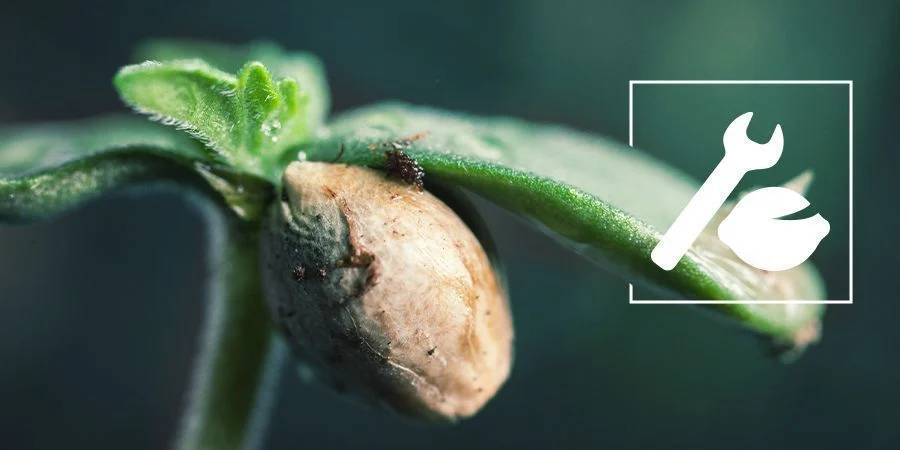
Here we offer numerous tips on avoiding issues during the germination and seedling phases of your cannabis grow. If your seeds aren't sprouting, or your seedlings are struggling to grow, you're likely to find the reason for your problem, and its solution, in this guide!
Before you can start tending to your crop of weed plants, you have to get those sprouts out of the ground first! Germinating cannabis seeds can be quite a fiddly process, as can looking after the newly hatched weed seedlings. Find out the common issues cannabis growers face during the germination and seedling stages, and their solutions.
Common cannabis germination issues
Throughout the whole cultivation process, but especially in the earliest stages, careful and exact practice will make success much more likely. Seeds and seedlings are vulnerable and can die or become stunted easily, or even fail to germinate at all.
Below, we'll break down each potential issue you could experience during these early stages of your grow, and what you can do to remedy the situation.
Cannabis seeds not germinating (day 0)
If your seeds aren’t germinating at all, it could be for one of the following reasons.
Poor-quality seeds
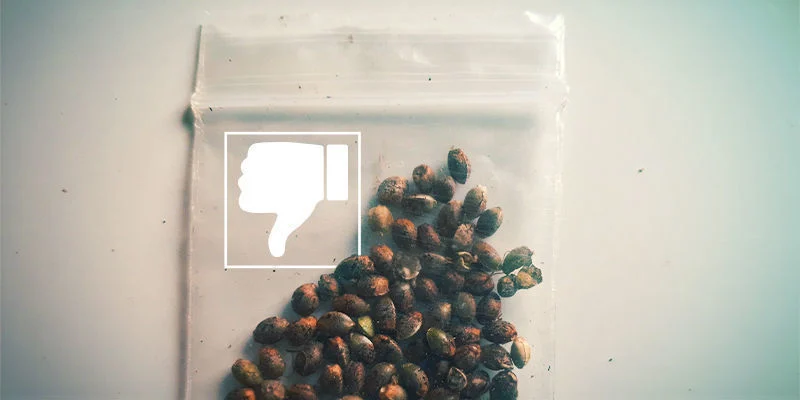
Maybe you found some seeds in a bag of weed and thought you might try growing them, or perhaps you bought them super cheap somewhere. It could even be that you got seeds from a great breeder, but they’re just duds. In any case, poor-quality seeds have a much lower chance of germinating or producing viable plants.
Solution:
Get some good seeds! This needn’t be too hard. Genuinely good-quality breeders perform rigorous germination rate and quality tests, meaning the vast majority of them should be healthy and capable of sprouting. Of course, there will always be exceptions, but buying from a good breeder or seed bank will greatly increase the chances of successful germination.
Seedshop
Click here to browse countless varieties of regular, feminized, and autoflowering cannabis seeds from the best banks in the world.
Handling seeds with bare hands
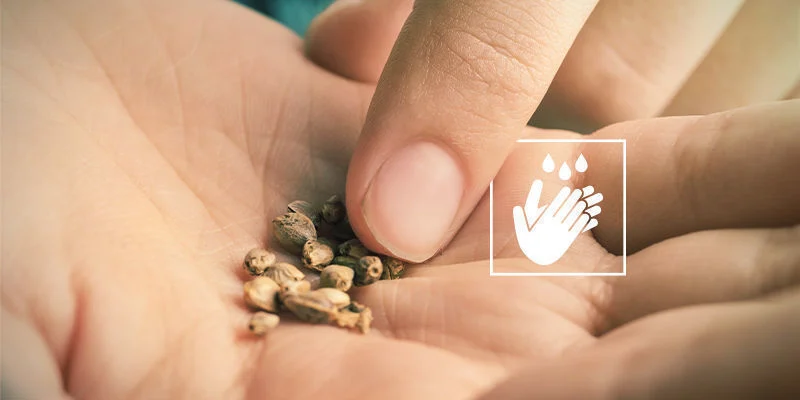
Hands can carry all sorts of pathogens, such as bacteria and fungal spores, that can contaminate seeds and seedlings. At this young stage, they are very susceptible to infection, so avoiding direct touch is best!
Solution:
Be hygienic! If you want to be properly sterile, wear latex gloves or use sterilised tweezers to handle your cannabis seeds. If you don’t want to do this, then at least thoroughly wash your hands prior to handling your weed seeds or seedlings.
Water quality
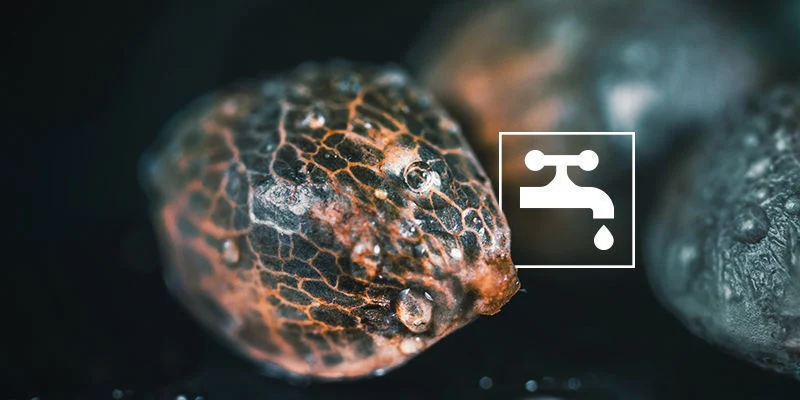
Depending on where you live, tap water could be full of compounds that will inhibit your seeds from germinating. Chemicals such as chlorine can be very harmful to seeds and young cannabis plants. Later in a plant’s life, tap water is a much safer bet—although it’s worth figuring out its mineral content so you can feed properly.
Solution:
Use purified or bottled water. It might seem indulgent, but they’re only young, and this is a crucial stage in their little lives, so give them what they need, and they’ll reward you later on!
Seeds not buried deep enough
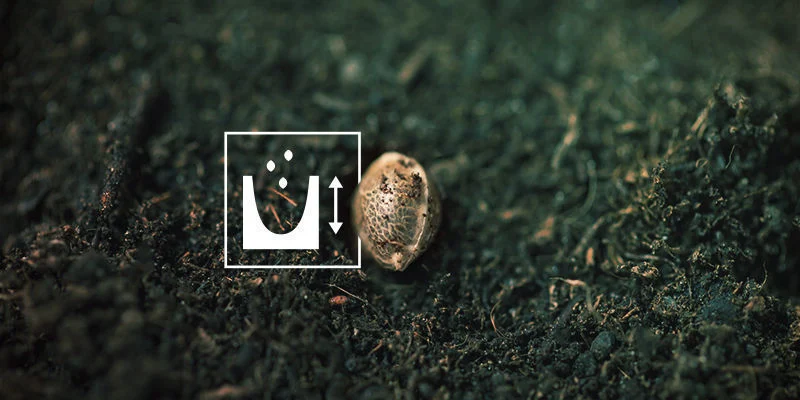
If seeds aren’t buried deep enough, they won’t have enough moisture, and can dry out. Moisture is what triggers the sprout to break through the seed shell, so this is really crucial.
Solution:
Generally, it’s recommended to germinate seeds around a knuckle (0.5–1cm) deep in the soil. This is the optimum depth for them. On top of this, germinating in propagation chambers will maintain a high and correct humidity range (around 70% RH or more), increasing the moisture content and likelihood of germination.
Low temperatures
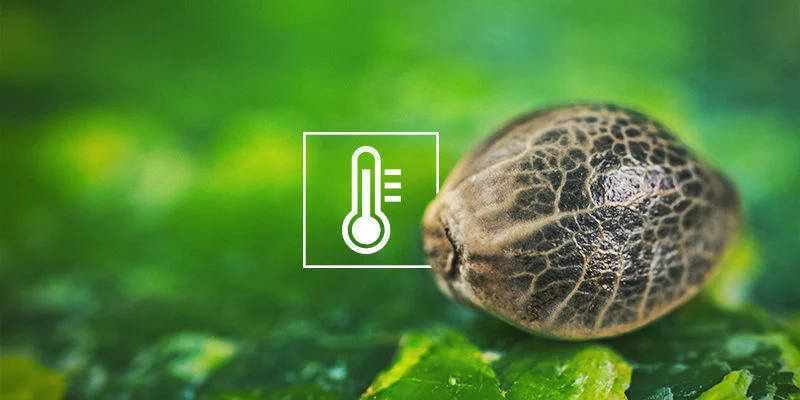
In nature, cannabis seeds sprout in spring, as the temperatures warm up. So if they think it’s too cold, they won’t germinate. Moreover, certain pathogens thrive in cool temperatures, so even if they do germinate, they may not fare as well.
Solution:
Keep them warm! If growing indoors, this shouldn’t be too hard. A propagation chamber situated in a comfortably warm room should do the job. Even if you intend to grow outside, you can still germinate indoors to give your marijuana seeds the best start and keep them safe from sudden cold snaps. If you want to carry out the whole process outdoors, you’ll have to hang on until you’re certain of mild nights and warmer days, otherwise you seriously risk unfortunate results.
Soil packed too tight

Tightly packing the soil over your seeds, or just burying them too deep, can be a real issue. First, a freshly “popped” seed is (unsurprisingly) not the strongest being on the planet. In fact, it’s incredible how strong new shoots actually are. But bury them too deep, and they will not have the strength to push above the earth. Moreover, they could suffer from oxygen deprivation if the soil is too compacted or they’re buried too deep, and this will stunt development entirely.
Solution:
As mentioned, bury them only a knuckle deep in the soil, and lightly brush a covering back over them and pack it down with only the lightest touch. There’s no need for the soil covering to be compact.
Underwatering
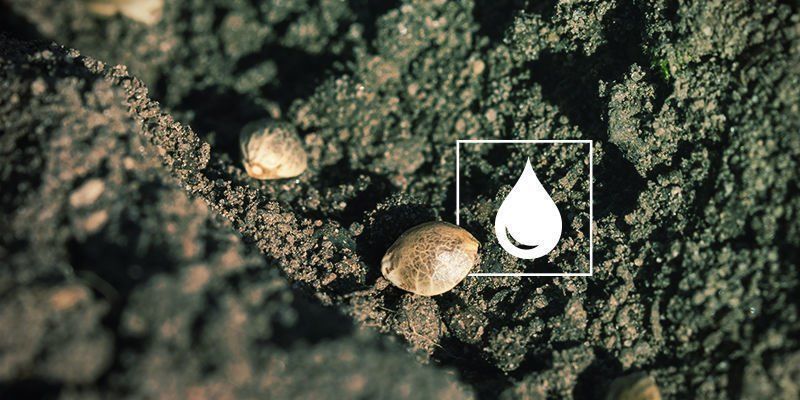
Like we said, seeds need moisture to trigger germination. If you haven’t supplied enough water, they won’t sprout.
Solution:
You don’t need to soak the soil by any means, but you want it pretty damp. If growing in a propagation chamber, you may consider misting the inside with water to promote moisture and high humidity.
Low humidity
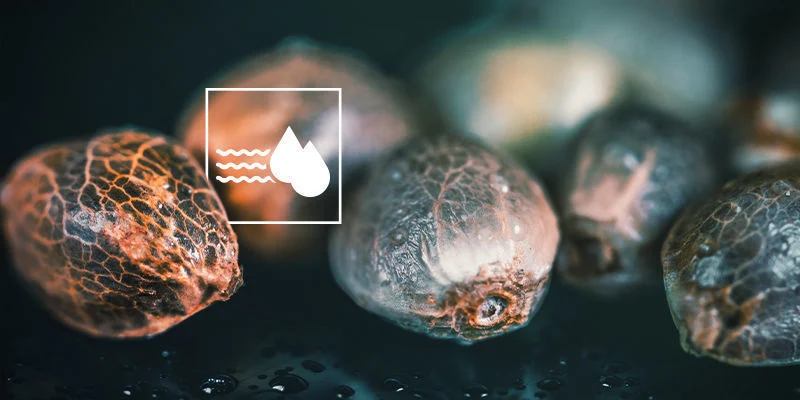
On that note, if the humidity gets too low, your seeds may not germinate. Humidity is one of the core tenets of cannabis seed germination, so it’s crucial your germination setup doesn’t dry out.
There are two main reasons the humidity may be too low. First, it could be too cold. Second, there may not be enough moisture in the soil.
Solution:
Water well and keep the ambient temperature warm enough (at least 21°C). Using a propagation chamber will keep the humidity high and trap a little warmth. These chambers are specifically designed for germinating seeds, so give them a go!
Cannabis seeds germinated but stopped growing (day 1–7)
You might find your seeds sprout, but then suddenly halt and grow no more. What’s going on? Various issues could be at play, and you need to identify and act quickly so your seedlings don’t die off.
Fungal or bacterial infection
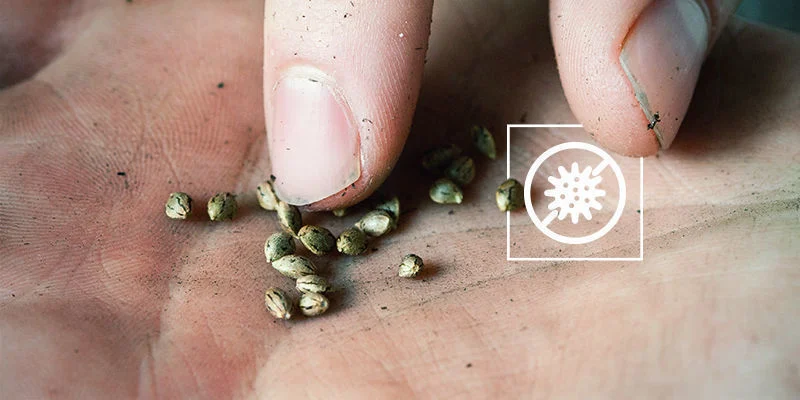
If, for instance, you handled your weed seeds with dirty hands, they may develop fungal or bacterial infections. For newborn seedlings, a slight infection can be enough to use up all their energy and stop their development.
Solution:
In this case, prevention is the best cure. Handle the seeds carefully when planting, and limit touching your seedlings as much as possible. To prevent fungal infection in the germination substrate, keep humidity and temperature within an ideal range, and keep the surrounding environment clean. Once an infection sets in at this stage, there’s not so much you can do to reverse it.
Overwatering
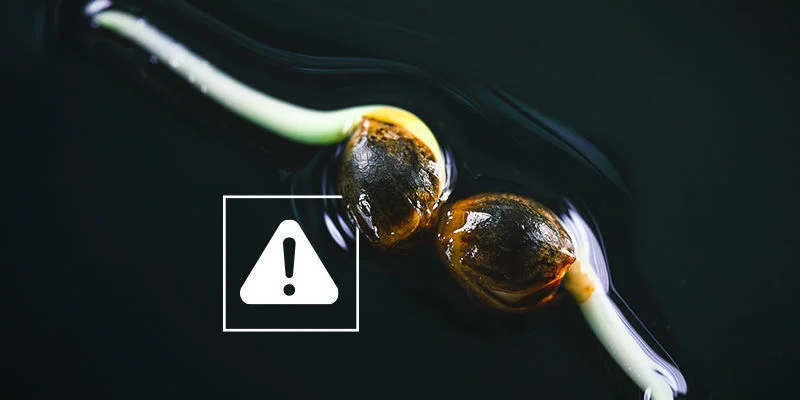
Much as plants need water, there is absolutely such a thing as too much. Overzealous watering is easy to fall victim to, and also very dangerous to seedlings. It can deprive their roots of oxygen and cause them to rot, which, at this stage, can be catastrophic.
The same goes for seeds too! Soaking seeds is generally not recommended. Although some growers germinate their weed seeds in a glass of water, it is usually advised to leave them in for no longer that 24 to 36 hours.
Solution:
Primarily, rein in your watering desires and be conservative. Again, a spray bottle is your friend here. While seeds and young cannabis plants need high levels of moisture, there’s no need to soak them! If you think you’ve overwatered your seedlings, the best bet might be to remove them from the soil and try to dry their roots. Then, replant them in slightly drier soil.
Excessive temperatures
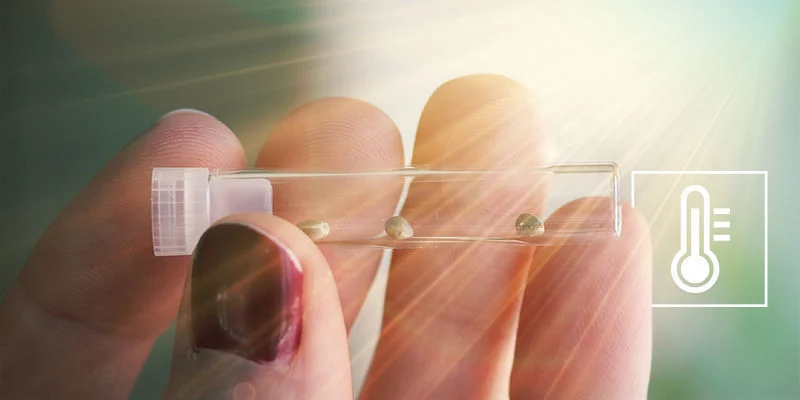
As with water, too much heat is also a bad thing. Like anything else, cannabis seedlings have an optimal temperature range (around 20–30°C), outside of which they’ll struggle to grow.
Solution:
If germinating in a chamber, it may be worth investing in a thermo-hygrometer so you always know the temperature and humidity levels your seeds are exposed to, and can adjust accordingly.
Weak or stretched seedlings (day 7+)
As seedlings grow, you may still encounter problems. Thankfully, the older they get, the tougher they become, and the easier it is to reverse issues. If you notice that your seedlings are growing very tall and spindly and/or falling over, look out for the following issues.
Not enough light
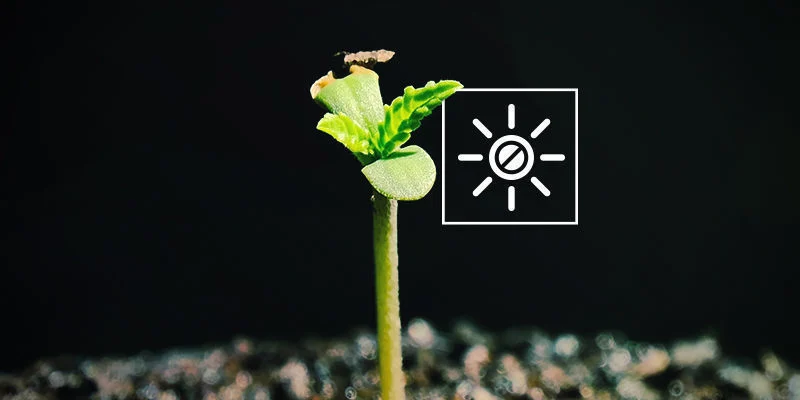
If your plants don’t sense enough light, they will shoot upwards, trying to break through what they perceive to be a canopy of other plants and search out the sun.
Solution:
The first port of call is to check the distance between your young plants and the light source. It might be worth lowering your grow lights slightly, as this could actually help to keep seedling height in check. Furthermore, cannabis plants favour certain types of light during specific stages of growth. Seedlings enjoy light from the blue spectrum specifically, as this encourages healthy root growth and development.
The issue could also be that, as your young plants begin to enter the vegging stage proper, the light is simply not strong enough. Though seedlings tend to do best under cool CFLs, vegging plants may desire something stronger as they get older, such as LED or MH lights.
Wrong-sized pots
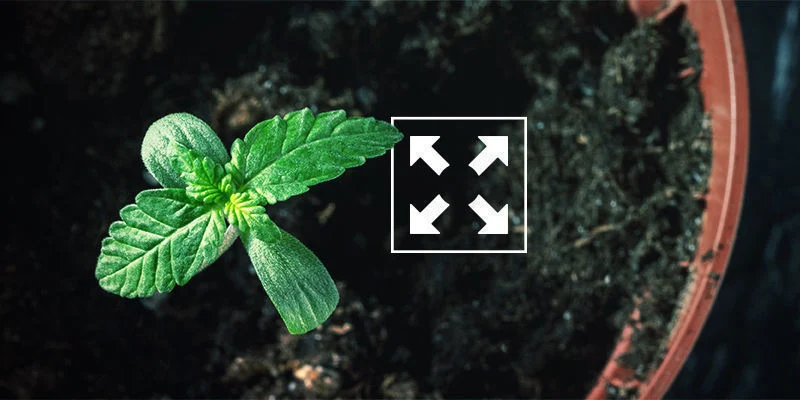
If your seedlings are situated in cramped pots, their roots will not be able to support the plant growing above ground, meaning it will end up weak. If left to suffer, your plant may well not make it to maturity.
Solution:
Transplant into bigger pots. Realistically, a cannabis plant enjoys around around 10 litres to mature in—and sometimes a whole lot more. Transplanting sooner rather than later is much easier, as a big root ball comes with several potential issues. Once your weed seedlings have three or four sets of leaves, move them to their next or final pots, and they should be happy enough!
Why won’t my cannabis seeds germinate?
The above points are not exhaustive, but among them you are likely to find the reason for your woes. While cannabis plants are surprisingly tough, seeds and seedlings are not. You must treat them with care, and know that issues at these stages can often spell doom—so avert them!













 United States
United States











